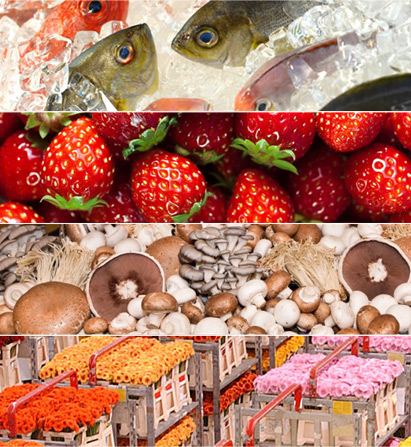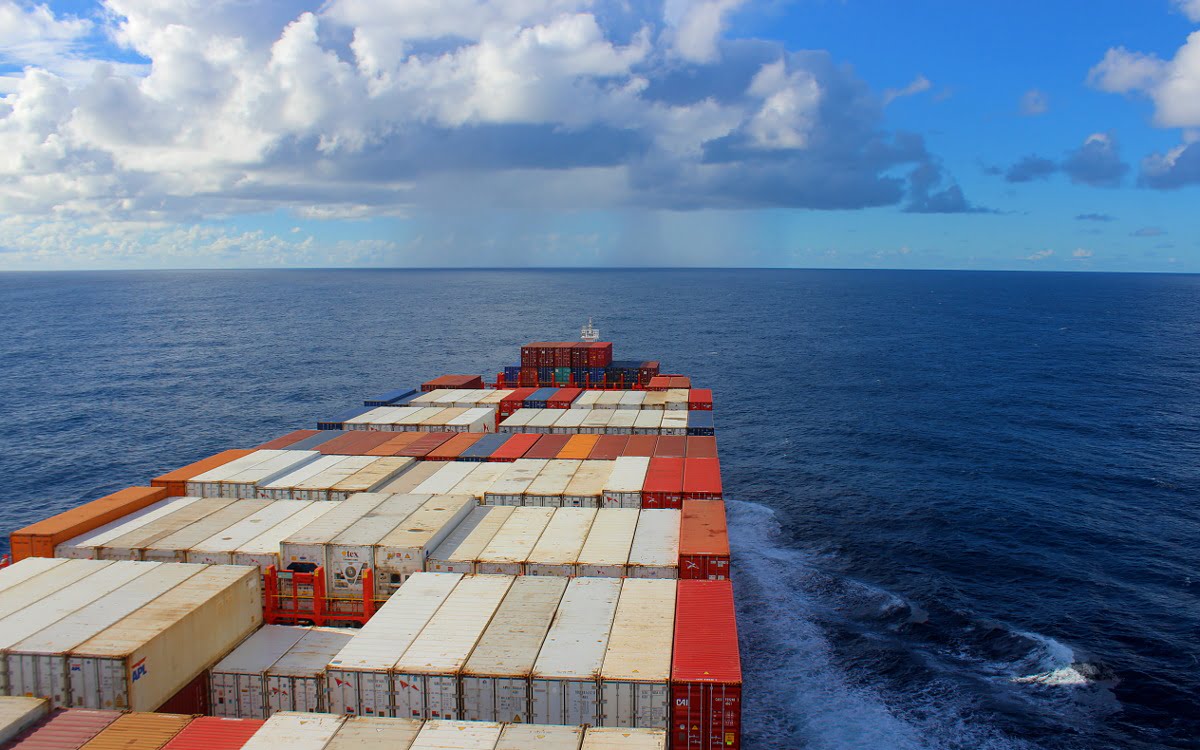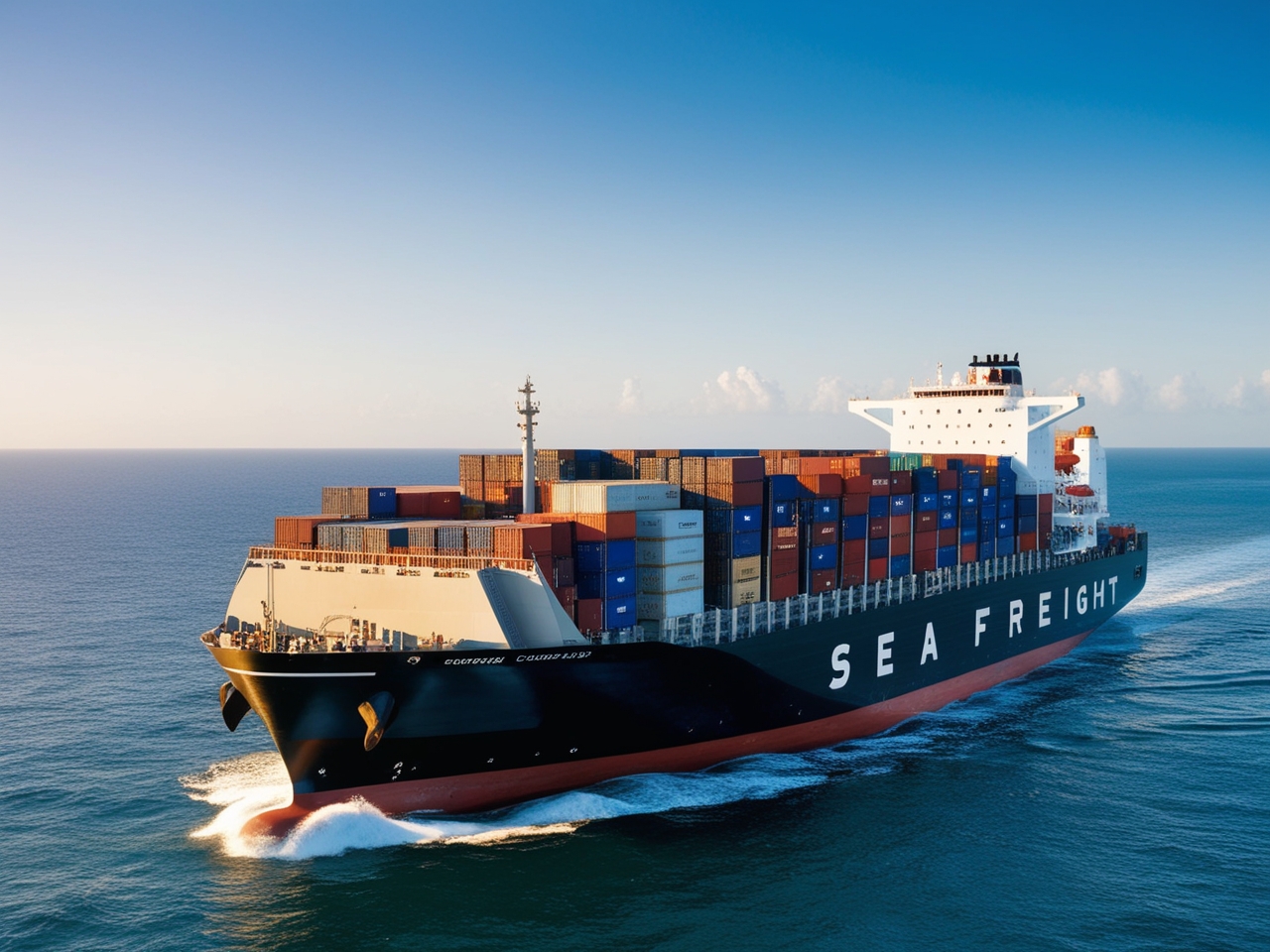Shipping perishable goods, such as fresh produce, pharmaceuticals, and other temperature-sensitive items, presents unique challenges that demand specialized knowledge and expertise.Choosing the right freight forwarder for perishable goods is essential to maintaining product integrity and minimizing losses associated with spoilage. This guide aims to provide a comprehensive overview of the key considerations and best practices for selecting a reliable perishable freight forwarder for shipments from China to the UK.

Understanding Perishable Freight
What is Perishable Freight?

Perishable freight refers to goods that have a limited shelf life and require specific conditions to preserve their quality during transit. Examples of perishable goods include:
- Fresh produce: Fruits, vegetables, dairy products, and meats.
- Pharmaceuticals: Medicines and vaccines that need temperature control.
- Seafood: Fish, shellfish, and other marine products.
- Flowers: Fresh flowers and plants that require humidity control.
Challenges in Shipping Perishable Goods
Shipping perishable goods involves several challenges that must be addressed to ensure the products arrive in optimal condition. These challenges include:
Temperature Control
Maintaining the right temperature is crucial for preserving the quality of perishable goods. Different products require different temperature ranges, and even slight deviations can result in spoilage. For example, fresh produce may need to be kept just above freezing, while certain pharmaceuticals might require sub-zero temperatures. Using specialized refrigerated containers, also known as reefer containers, and advanced temperature monitoring systems are essential to achieving this.
Time Sensitivity
Perishable goods have a limited shelf life, making timely delivery critical. Delays at any stage of the shipping process can lead to significant losses. Effective planning and coordination are needed to minimize transit times and avoid delays. This includes choosing optimal shipping routes, efficient handling at customs clearance, and prompt transportation to the final destination.
Packaging Requirements
Proper packaging is vital for protecting perishable goods from external factors such as temperature fluctuations, physical damage, and contamination. For instance, fresh produce may require breathable packaging to prevent excess moisture buildup, while pharmaceuticals need insulated packaging to maintain a stable temperature. Using high-quality packaging materials and adhering to industry standards can help mitigate these risks.
Understanding these challenges highlights the importance of selecting a freight forwarder with expertise in handling perishable goods. A reliable perishable freight forwarder will have the necessary infrastructure, technology, and experience to ensure your shipments arrive in optimal condition, making them a crucial partner in your supply chain.
By addressing the specific needs of perishable goods through advanced logistics solutions, companies can ensure their products reach consumers safely and efficiently. Whether it’s fresh fruits from China or critical pharmaceuticals, the right freight forwarder can make all the difference in maintaining product integrity and customer satisfaction.
Key Considerations When Choosing a Perishable Freight Forwarder
Selecting the right freight forwarder for perishable goods is a crucial decision that can significantly impact the success of your shipments. Here are the key considerations to keep in mind:
Experience and Expertise
When it comes to perishable freight, experience and expertise are paramount. A freight forwarder with a proven track record in handling temperature-sensitive and time-critical shipments will have the necessary knowledge to navigate the complexities of perishable logistics. Look for companies with specific experience in your type of goods, whether it’s fresh produce, pharmaceuticals, seafood, or flowers. Their expertise will ensure that your perishable items are handled with the utmost care and precision.
Network and Reach
A well-established network is vital for the seamless transportation of perishable goods from China to the UK. The chosen freight forwarder should have a robust network of partners, including airlines, shipping lines, and ground transportation providers, to facilitate smooth and efficient logistics. Additionally, they should have a comprehensive understanding of both origin and destination markets, including regulatory requirements and customs clearance procedures. This knowledge will help streamline the shipping process and minimize delays.
Technology and Equipment
Advanced technology and state-of-the-art equipment play a crucial role in maintaining the quality of perishable goods during transit. Ensure that the freight forwarder utilizes modern tracking systems that provide real-time visibility into the shipment’s status and condition. Temperature-controlled containers, also known as reefer containers, are essential for maintaining the required temperature range throughout the journey. These containers should be equipped with temperature monitoring devices to ensure compliance with the specified conditions.
Regulatory Compliance
Compliance with international standards and regulations is essential for the successful transportation of perishable goods. The freight forwarder should be well-versed in the relevant regulations governing the shipment of perishable items, including those related to food safety, pharmaceutical standards, and environmental controls. Their expertise in customs clearance will help navigate the complexities of international trade, ensuring that your shipments meet all necessary requirements.
Top Perishable Freight Forwarders from China to the UK
Choosing a reliable freight forwarder is crucial for the successful transportation of perishable goods.

Dantful International Logistics stands out as a leading provider of perishable freight forwarding services. With a comprehensive range of services, including Air Freight, Ocean Freight, customs clearance, and insurance, Dantful ensures that your perishable goods are handled with the utmost care and efficiency. Their state-of-the-art technology and extensive network make them a top choice for businesses looking to ship perishable items from China to the UK. Customer testimonials and case studies highlight their commitment to quality and reliability.
Dantful International Logistics Services:
- Dantful Ocean Freight Services
- Air Freight From China
- Amazon FBA Freight Forwarding
- WAREHOUSE Services
- One-Stop Customs Clearance Solution
- Cargo Insurance Services in China
- DDP Shipping Services By Dantful Logistics
- Out of Gauge Cargo Transportation Shipping Services
Best Practices for Shipping Perishable Goods
Ensuring the safe and efficient transportation of perishable goods requires meticulous planning and adherence to best practices. Here are some key strategies to keep in mind:
Packaging and Labeling
Packaging plays a critical role in protecting perishable goods from external factors such as temperature fluctuations, physical damage, and contamination. Here are some best practices for packaging:
- Use High-Quality Materials: Opt for durable and insulated packaging materials that provide excellent thermal protection. Foam, gel packs, and dry ice are commonly used to maintain temperature stability.
- Breathable Packaging for Fresh Produce: Fresh fruits and vegetables require breathable packaging to prevent moisture buildup and reduce the risk of spoilage.
- Insulated Packaging for Pharmaceuticals: Pharmaceuticals often require insulated packaging to maintain a stable temperature and protect the integrity of the products.
- Proper Labeling: Clearly label packages with information such as “Perishable,” “Keep Refrigerated,” or “Temperature-Sensitive.” This ensures that handlers are aware of the specific requirements.
Temperature Monitoring
Maintaining the correct temperature throughout the shipping process is crucial for preserving the quality of perishable goods. Here are some best practices for temperature monitoring:
- Use Reefer Containers: Refrigerated containers, also known as reefer containers, are essential for maintaining the required temperature range. These containers come with built-in cooling systems that can be adjusted based on the type of goods being transported.
- Temperature Monitoring Devices: Equip shipments with temperature monitoring devices that provide real-time data on the temperature inside the container. This allows for immediate corrective actions if deviations occur.
- Pre-Condition Containers: Before loading perishable goods, pre-condition the containers to the required temperature. This ensures that the goods are immediately placed in the optimal environment.
Real-time Tracking
Real-time tracking provides visibility into the location and condition of shipments, allowing for proactive management. Here are some best practices for real-time tracking:
- Advanced Tracking Systems: Utilize advanced tracking systems that provide real-time updates on the location, temperature, and status of the shipment. This information can be accessed through online platforms or mobile apps.
- Alerts and Notifications: Set up alerts and notifications for any deviations from the specified conditions. This allows for timely intervention to address potential issues.
- Collaborate with Partners: Work closely with logistics partners, including airlines, shipping lines, and ground transportation providers, to ensure seamless tracking and communication.
Handling Delays and Issues
Delays and unexpected issues can occur during the transportation of perishable goods. Here are some best practices for handling such situations:
- Contingency Planning: Develop contingency plans for potential delays or issues. This includes identifying alternative routes, backup carriers, and emergency contacts.
- Communication: Maintain open communication with all stakeholders involved in the shipping process. Provide regular updates and address any concerns promptly.
- Insurance Coverage: Invest in comprehensive insurance coverage for perishable goods. This provides financial protection against losses due to spoilage, damage, or delays.
By following these best practices, businesses can ensure the safe and efficient transportation of perishable goods, minimizing the risk of spoilage and maintaining product quality.
Read More:
- Shipping From China To Netherlands
- Shipping From China To Spain
- Shipping From China To Germany
- Shipping From China To France
- Shipping From China to Italy
- Shipping From China To Poland
- Shipping From China to United Kingdom
FAQ (Frequently Asked Questions)
What are perishable goods?
Perishable goods are items that have a limited shelf life and require specific conditions to preserve their quality during transit. Examples include fresh produce, pharmaceuticals, seafood, and flowers.
What is the significance of temperature control in perishable freight?
Temperature control is crucial for maintaining the quality of perishable goods. Different products require different temperature ranges, and deviations can result in spoilage. Using refrigerated containers and temperature monitoring devices is essential.
How can I choose the right perishable freight forwarder?
When choosing a perishable freight forwarder, consider factors such as experience and expertise, network and reach, technology and equipment, and regulatory compliance. Dantful International Logistics is a leading provider with a proven track record in handling perishable goods.
What are some cost-effective solutions for perishable freight?
Cost-effective solutions include optimizing routes and schedules, consolidating shipments, and investing in insurance coverage. These strategies help reduce costs while ensuring the quality of perishable goods.
How can I ensure the safe transportation of perishable goods?
To ensure the safe transportation of perishable goods, follow best practices such as using high-quality packaging, maintaining temperature control, utilizing real-time tracking systems, and having contingency plans for delays and issues.
References
- International Air Transport Association (IATA): Provides guidelines and standards for the transportation of perishable goods by air. IATA Perishable Cargo Regulations
- World Health Organization (WHO): Offers guidelines for the storage and transportation of temperature-sensitive pharmaceuticals. WHO Good Distribution Practices
- Food and Agriculture Organization (FAO): Provides resources and information on the proper handling and transportation of perishable food items. FAO Food Handling and Transportation
- United States Food and Drug Administration (FDA): Offers regulations and guidelines for the transportation of perishable pharmaceuticals. FDA Good Distribution Practice

Young Chiu is a seasoned logistics expert with over 15 years of experience in international freight forwarding and supply chain management. As CEO of Dantful International Logistics, Young is dedicated to providing valuable insights and practical advice to businesses navigating the complexities of global shipping.





















 Afrikaans
Afrikaans Shqip
Shqip አማርኛ
አማርኛ العربية
العربية Հայերեն
Հայերեն Azərbaycan dili
Azərbaycan dili Euskara
Euskara Беларуская мова
Беларуская мова বাংলা
বাংলা Bosanski
Bosanski Български
Български Català
Català Cebuano
Cebuano Chichewa
Chichewa 简体中文
简体中文 繁體中文
繁體中文 Corsu
Corsu Hrvatski
Hrvatski Čeština
Čeština Dansk
Dansk Nederlands
Nederlands English
English Esperanto
Esperanto Eesti
Eesti Filipino
Filipino Suomi
Suomi Français
Français Galego
Galego ქართული
ქართული Deutsch
Deutsch Ελληνικά
Ελληνικά Kreyol ayisyen
Kreyol ayisyen Harshen Hausa
Harshen Hausa Ōlelo Hawaiʻi
Ōlelo Hawaiʻi עִבְרִית
עִבְרִית हिन्दी
हिन्दी Hmong
Hmong Magyar
Magyar Íslenska
Íslenska Igbo
Igbo Bahasa Indonesia
Bahasa Indonesia Gaeilge
Gaeilge Italiano
Italiano 日本語
日本語 Basa Jawa
Basa Jawa ಕನ್ನಡ
ಕನ್ನಡ Қазақ тілі
Қазақ тілі ភាសាខ្មែរ
ភាសាខ្មែរ 한국어
한국어 كوردی
كوردی Кыргызча
Кыргызча ພາສາລາວ
ພາສາລາວ Latin
Latin Latviešu valoda
Latviešu valoda Lietuvių kalba
Lietuvių kalba Lëtzebuergesch
Lëtzebuergesch Македонски јазик
Македонски јазик Malagasy
Malagasy Bahasa Melayu
Bahasa Melayu മലയാളം
മലയാളം Maltese
Maltese Te Reo Māori
Te Reo Māori मराठी
मराठी Монгол
Монгол ဗမာစာ
ဗမာစာ नेपाली
नेपाली Norsk bokmål
Norsk bokmål پښتو
پښتو فارسی
فارسی Polski
Polski Português
Português ਪੰਜਾਬੀ
ਪੰਜਾਬੀ Română
Română Русский
Русский Samoan
Samoan Gàidhlig
Gàidhlig Српски језик
Српски језик Sesotho
Sesotho Shona
Shona سنڌي
سنڌي සිංහල
සිංහල Slovenčina
Slovenčina Slovenščina
Slovenščina Afsoomaali
Afsoomaali Español
Español Basa Sunda
Basa Sunda Kiswahili
Kiswahili Svenska
Svenska Тоҷикӣ
Тоҷикӣ தமிழ்
தமிழ் తెలుగు
తెలుగు ไทย
ไทย Türkçe
Türkçe Українська
Українська اردو
اردو O‘zbekcha
O‘zbekcha Tiếng Việt
Tiếng Việt Cymraeg
Cymraeg יידיש
יידיש Yorùbá
Yorùbá Zulu
Zulu